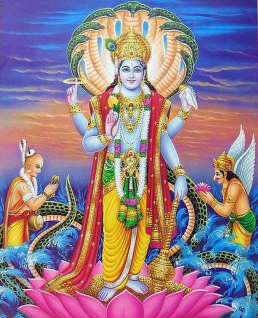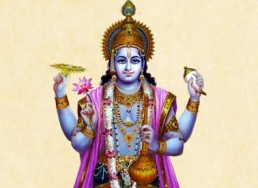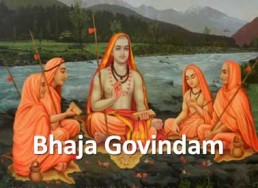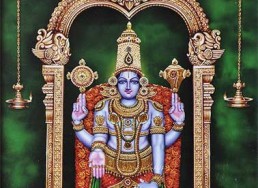Somanatha Vaidyanatha
एतान् संस्मरतः प्रातः व्याधिः स्पर्श न विद्यते ।।
etān saṃsmarataḥ prātaḥ vyādhiḥ sparśa na vidyate ..
- सौमनाथं (somanāthaṃ) – Lord Somanātha; a form of Śiva associated with the moon.
- वैद्यनाथं (vaidyanāthaṃ) – Lord Vaidyanātha; Śiva in his form as the divine healer.
- धन्वन्तरिम् (dhanvaṃtarim) – Dhanvantari; the divine physician and deity of Ayurveda.
- अश्विनौ (aśvinau) – The twin Ashvins; divine physicians who serve as healers of the gods.
- एतान् (etān) – These; referring to the mentioned deities.
- संस्मरतः (saṃsmarataḥ) – Remembering; holding in remembrance or recalling with reverence.
- प्रातः (prātaḥ) – In the morning; at the beginning of the day.
- व्याधिः (vyādhiḥ) – Disease; ailments or afflictions.
- स्पर्शः (sparśaḥ) – Touch; contact or influence.
- न (na) – Not; negation, indicating that disease will not.
- विद्यते (vidyate) – Exist; be present or come into contact.

Description
Other Vishnu Shlokams
Acyutam Kesavam
Everybody should meditate regularly upon Achyuta, Kesava, Vishnu, Hari, Satya, Janardhana and Narayana, the swan, which signifies the quintessence of things.
Akasat Patitam Toyam
As all rains falling from the sky reach the ocean; so also the prayers to all gods ultimately get to the Lord Keshava.
Apavitra Pavitro
Om, if one is Apavitra (Impure) or Pavitra (Pure), or even in all other conditions, he who remembers Pundarikaksha (another name of Sri Vishnu, literally meaning with lotus-like eyes), he becomes pure
Bhaja Govindam
Shlokams,Vishnu,Sankara,Govinda,Krishna,Prakarana Grantha
Bhaja Govindam is one of the most popular hymns penned by Adi Shankaracharya. He has packed into the Bhaja Govindam song the substance of all Vedanta, and set the oneness of Jnana and Bhakti to melodious music.
Dhanvantari Mantra
The Dhanvantari Mantra calls upon the divine healer, Lord Dhanvantari, the god of Ayurveda, for health and protection from ailments.
Kayena Vaca
Whatever I do either by body, speech, mind or sensory organs, either with my personal knowledge or natural trait, I surrender and submit all to that to supreme divine Narayana.
Lakshmi Narasimha Karavalambam
Narasimha is a fierce avatar of the Hindu god Vishnu, one who incarnates in the form of part lion and part man to destroy evil and end religious persecution and calamity on Earth, thereby restoring Dh
Mantra Pushpam
The Mantra Pushpam (literally translating to "Flower of Mantras") is a collection of sacred verses from the 10th chapter of Taittiriya Aranyaka of Krishna Yajur Veda. Each verse begins with an exploration of the relationship between the flower of…
Megha Syamam
Salutations to Sri Vishnu who is beautiful like the dark clouds, and who is wearing yellow garments of silk; Who has the mark of Srivatsa on his chest; and whose body is shining with the radiance of t
Namami Narayana Pada
I salute the lotus-feet of Narayana, always, propitiate Narayana, speak of the pure name of Narayana and bear in mind the immutable factuality of Narayana.
Narayana Kavacham
Shlokams,Vishnu,Govinda,Krishna
The Narayana Kavacham occurs in chapter eight of the sixth skanda of Bhagavada Purana. It is an Armour (Kavach) to protect ourselves from all our enemies (including negativitie
Narayanam Hrishikesam
I salute Narayana, Hrishikesa, Govinda, Garudadhwaja, Vaasudeva, Hari, Krishna and Kesava.
Narayaneti Vagvalvi
The four letters 'Na', 'Ra,'Ya', 'Na' are the four shoots on the creeper of speech and are undoubtedly indicative of the four Purusharthas- Dharma, Artha, Kaama and Moksha.
Ranganatha Ashtakam
Ranganatha Ashtakam was written by Adi Sankara Bhagavatpada when he stood before Sri Ranganatha swamy in Srirangam, during his travels. This Ashtakam reveals that Adi Sankara was overwhelmed by Lord R
Sashanka Chakram Sakirita
I salute, prostrate with my head, to that four-armed Lord Vishnu, who is ornamented with the shankh (conch) and chakra (the divine wheel), the crown and ear-drops, yellow silk robes, lotus-eyes, decor
Shantakaram
We bow to the only lord of all worlds, Vishnu who is of peaceful appearance, reclining on the serpent, with a lotus from the navel, lord of gods, the basis of the universe, vast like the sky, coloured
Swayam Vyakta Sthalam
First, called "Ranga", the great temple (of Srirangam), made known by the (great lord) Ranga, (Then) Srimushanam and Venkatadri, Salagrama and Naimisha, Toyadri (Thiruneermalai), Pushkara and indeed N
Venkatesa Suprabhatam
This shlokam is taken from Sri Valmiki's Srimadh Ramayanam. During the journey with Sage Viswamitra, both Rama and Lakshmana had rested for the night on the banks of the Ganga river. As the dawn was
Vishnu Sahasranamam
The Vishnu Sahasranam is found in the Mahabharatha. Literally translated this means thousand names of Vishnu. This is found in the Anushasanika Parvam (chapter relating to orders or rules to the kings) of Mahabharatha. Though it describes one…
Vishnu Shatanama Stotram
The Vishnu Shatanama Stotram is a revered hymn that encapsulates the divine attributes and various forms of Lord Vishnu, serving as a powerful invocation for devotees seeking spiritual elevation and liberation. The stotra, composed by Sri Veda…
Vishnu Shatpadi Stotram
The Sri Vishnu Shatpadi is a revered Sanskrit stotra (hymn) dedicated to Lord Vishnu, the preserver and protector in Hinduism. Composed by the illustrious philosopher and saint, Sri Shankaracharya, this hymn comprises six verses (ṣaṭpadī) that…
Somanatha Vaidyanatha – Vishnu – In Sanskrit, English Translation, Meaning, Significance and Audio.



